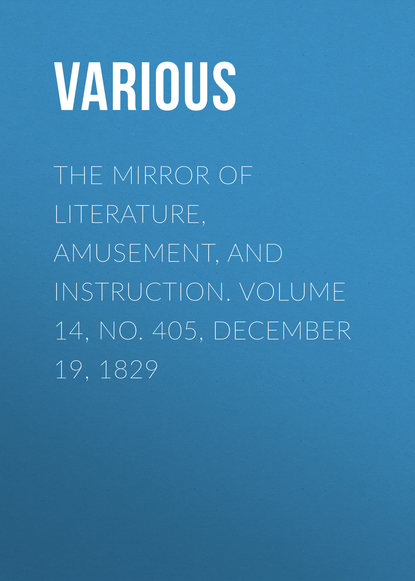По всем вопросам обращайтесь на: info@litportal.ru
(©) 2003-2024.
✖
The Mirror of Literature, Amusement, and Instruction. Volume 14, No. 405, December 19, 1829
Автор
Год написания книги
2018
Настройки чтения
Размер шрифта
Высота строк
Поля
Thus, in his forty-seventh year, did the "Bravest of the Brave" expiate one great error, alien from his natural character, and unworthy of the general course of his life. If he was sometimes a stern, he was never an implacable, enemy. Ney was sincere, honest, blunt even: so far from flattering, he often contradicted him on whose nod his fortunes depended. He was, with rare exceptions, merciful to the vanquished; and while so many of his brother marshals dishonoured themselves by the most barefaced rapine and extortion, he lived and died poor.
Ney left four sons, two of whom are in the service of his old friend, Bernadotte.
THE ANNIVERSARY
BY ALARIC A. WATTS
"Nay, chide me not; I cannot chase
The gloom that wraps my soul away,
Nor wear, as erst, the smiling face
That best beseems this hallow'd day
Fain would my yearning heart be gay,
Its wonted welcome breathe to thine;
But sighs come blended with my lay,
And tears of anguish blot the line.
I cannot sing as once, I sung,
Our bright and cheerful hearth beside;
When gladness sway'd my heart and tongue,
And looks of fondest love replied—
The meaner cares of earth defied,
We heeded not its outward din;
How loud soe'er the storm might chide,
So all was calm and fair within.
A blight upon our bliss hath come,
We are not what we were of yore;
The music of our hearts is dumb;
Our fireside mirth is heard no more!
The little chick, its chirp is o'er,
That fill'd our happy home with glee;
The dove hath fled, whose pinions bore
Healing and peace for thee and me.
Our youngest-born—our Autumn-flower,
The best beloved, because the last;
The star that shone above our bower,
When many a cherish'd dream had past,
The one sweet hope, that o'er us cast
Its rainbow'd form of life and light,
And smiled defiance on the blast,
Hath vanished from our eager sight.
Oh, sudden was the wrench that tore
Affection's firmest links apart;
And doubly barb'd the shaft we wore
Deep in each bleeding heart of heart;
For, who can bear from bliss to part
Without one sign—one warning token;
To sleep in peace—then wake and start
To find life's fairest promise broken.
When last this cherish'd day came round,
What aspirations sweet were ours!
Fate, long unkind, our hopes had crown'd,
And strewn, at length, our path with flowers.
How darkly now the prospect lowers;
How thorny is our homeward way;
How more than sad our evening hours,
That used to glide like thought away.
And half infected by our gloom,
Yon little mourner sits and sighs,
His playthings, scatter'd round the room,
No more attract his listless eyes.
Nutting, his infant task, he plies,
On moves with soft and stealthy tread,
And call'd, in tone subdued replies,
As if he feard to wake the dead.
Where is the blithe companion gone,
Whose sports he lov'd to guide and share?
Where is the merry eye that won
All hearts to fondness? Where, oh where?
The empty crib—the vacant chair—
The favourite toy—alone remain,
To whisper to our hearts' despair,
Of hopes we cannot feel again.
Ah, joyless is our 'ingle nook,'—
Its genial warmth we own no more;
Our fireside wears an alter'd look,—
A gloom it never knew before;
The converse sweet—the cherish'd lore—
That once could cheer our stormiest day,—
Those revels of the soul are o'er;
Those simple pleasures past away.
Then chide me not, I cannot sing
A song befitting love and thee;—
My heart and harp have lost the string
On which hung all their melody;
Yet soothing sweet it is to me,
Since fled the smiles of happier years;
To know that still our hearts are free,
Betie what may, to mingle tears!"
Literary Souvenir for 1830.











